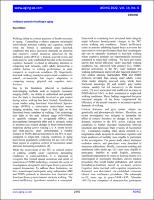Please use this identifier to cite or link to this item:
https://hdl.handle.net/20.500.12202/9479| Title: | Volitional control of walking in aging |
| Authors: | Holtzer, Roee 0000-0001-6639-0724 |
| Keywords: | Walking ability aging prefrontal cortex (PFC) walking performance dual-task walking paradigms cognitive interferences |
| Issue Date: | 2022 |
| Publisher: | Superintendent of Documents |
| Citation: | Holtzer R. (2022). Volitional control of walking in aging. Aging, 14(6), 2440-2441. http://doi.org/10.18632/aging.203986 |
| Series/Report no.: | Aging;14(6) |
| Abstract: | Walking ability is a robust predictor of health outcomes in aging. Compelling evidence supports meaningful interrelations between walking and cognition, notably when the former is performed under dual-task conditions that place increased demands on attention and executive control resources subserved by the prefrontal cortex (PFC) [1]. Indeed, a recent review and meta-analytic study established that due to the increased cognitive demands involved in allocating attention to competing task demands, older adults demonstrate a reliable decline in walking performance in dual- compared to single-task conditions [2]. Importantly, dual-task walking paradigms approximate conditions in natural environments that require adaptation to competing sensory, physical and cognitive interferences. (from Introduction) |
| Description: | Editorial / Open access |
| URI: | https://hdl.handle.net/20.500.12202/9479 |
| ISSN: | 0002-0966 (print) 2168-9040 (online) |
| Appears in Collections: | Ferkauf Graduate School of Psychology: Faculty Publications |
Files in This Item:
| File | Description | Size | Format | |
|---|---|---|---|---|
| Holtzer 2022 OA Editorial aging-v14i6-203986.pdf | 253.17 kB | Adobe PDF |  View/Open |
This item is licensed under a Creative Commons License

